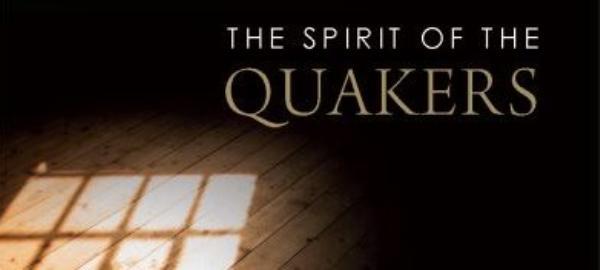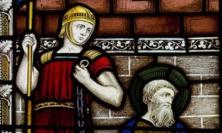‘Who are the Quakers, what do they believe and what do they practise? At the heart of their faith lies the conviction that everyone can have a direct experience of God without the mediation of priests or religious leaders. They express this in a unique form of worship that inspires them to work for change in themselves and in the world.’
A recent survey for Quakers in Britain showed that few people today know anything about Quakers. ‘A group of strict, narrow-minded Puritans who wear strange clothes’ might be a reasonable summary of the findings. Few of those questioned were aware that Quakers exist today, let alone knew what they believe and what they do. In his book, The Spirit of the Quakers, Geoffrey Durham seeks to rectify this.
As he explains in his introduction, Quakers have traditionally not promoted themselves, preferring to worship and serve the community quietly at the local, national, and international levels. However, this has changed in recent years. Geoffrey Durham was part of a small group of Quakers who developed an outreach programme known as ‘Quaker Quest: a Spiritual Path for our Time’, a series of meetings which aims to explain who Quakers are and what they believe. These sessions enable people to experience Meeting for Worship in the Quaker tradition – ‘waiting together in stillness’. The programme’s purpose is not to recruit new members. Some who have been to Quaker Quest have continued to attend; some have not. As a Quaker, and having taken part in Quaker Quest, I have felt the need for an accessible book which would enable people to continue on their own spiritual journey if that is what they choose to do.
Forty years ago, having been brought up in the northern, non-conformist tradition, yet becoming increasingly frustrated by a worship format of hymns, readings and prayers which left little space for silent reflection, my seventeen-year-old daughter asked if I would accompany her to a Quaker Meeting. Neither of us knew what to expect and both of us were desperately worried about sitting in silence for an hour. It was a strange and disconcerting experience but the stillness was compelling and I returned again – and again. The rest, as they say, is history. It also marked, for me, the beginning of a challenging spiritual journey of trying to live and work for peace, equality, simplicity and truth, the Quaker Way.
In his introduction, Geoffrey Durham captures the hesitancy Quakers have in answering religious questions, for we are all different and have different spiritual journeys. The anthology of Quakers writing from their personal experience under the various chapter headings highlights this. This diversity, however, may frustrate those who seek greater certainty in their spiritual life.
The book begins with a chronology of Quaker action. Here I would have liked to have seen a reference to Quaker involvement in the Kindertransport - Jewish children being brought to safety in Britain by Quakers before the Second World War – and also some mention of Quakers funding the establishment of the Department of Peace Studies at the University of Bradford in 1972. This is mentioned later in the book but I feel it should also be here.
The book is, in effect, in two parts with chapters focusing on aspects of Quaker faith and practice interspersed with four longer, moving extracts from personal Quaker journals.
The book begins with two sections which are at the heart of Quakerism. The first explores, through personal testimony, how the silent Meeting for Worship is the spiritual centre and powerhouse of being a Quaker. The second chapter, ‘Advices and Queries’, presents questions compiled over the years which constantly challenge Quakers in their attempt to live a life based on love and a concern for peace, equality, truth and justice. These statements, revised each generation, are precious to all Friends.
There follows a section from the Journal of George Fox written three hundred and fifty years ago. This answers the question, ‘When and how did Quakerism begin?’ Here was a man who believed that the true church was the people gathered in direct communion with God. This man, who is described here as sometimes ‘intolerant, arrogant and uncompromising’, nevertheless challenged the religious and secular authorities at that time with his message of simplicity and he paid the price through imprisonment and public ridicule. Reading this section of Fox’s Journal, one cannot help but sense the energy and power of this man, with his emphasis on a personal search for God and his commitment to a life of love. So began a movement known as the ‘Friends of Truth’, known today as The Religious Society of Friends (Quakers). Quakers today refer to themselves and to each other, not as Quakers, but as Friends.
Today Friends acknowledge there are many ways to God and these are respected. However, Friends, after 350 years, still gather together in simplicity, waiting in silence in their search for the Spirit, the Light, the Divine and – some would say – God. Watching Father Christopher Jamison in the BBC 2 series, The Big Silence, I am reminded that, although traditions differ, there are some things we share. George Fox’s condemnation of churches and priests would not hold with Quakers today. Certainly Friends have no ministers or priests in this country and they can gather anywhere in simplicity, but whilst staying true to our own beliefs we respect those of different Christian traditions, of other faiths and none.
In each of the subsequent sections Geoffrey Durham gently guides the reader towards the individual voices he has selected. The chapters on living the Quaker testimonies are certainly challenging. Recently Friends have added ‘sustainability’ and it is a pity that this has been omitted; however, it is the chapter on ‘Peacemaking’ which is, as always, the most challenging. To work for social change non-violently – ‘always?’ some will ask. Adam Curle, Quaker and first Professor of Peace Studies at Bradford University, is quoted as saying:
If we believe there is that of God in everyone we must treat all as we would be treated, with love, respect and with intelligent concern no matter what they have done or what they are doing. We must remember that their bad actions are not themselves; that whatever they do, they are grounded in the divinity which is the sole reality. We must help them to move from ignorance to knowledge, from hatred to love. We may have to prevent them from their ill doing, but if we act with love there could be no greater service.
A powerful challenge!
Geoffrey Durham’s book does indeed form an introduction to what it is to be a Quaker: to believe that there is that of God in everyone and, through love, to make our lives speak through our work for peace and justice.
I recommend this book to anyone wanting to know more about Quakers and the Quaker way. It provides an introduction for the general reader, a gentle ‘next step’ for those wishing to know more but it is not without challenges for committed Quakers. All those years ago I would have been grateful for it.
The reviewer, Hilary Browne, is a member of The Religious Society of Friends (Quakers). From November 2008 to February 2009 to she was a member of the World Council of Churches Ecumenical Accompaniment Programme in Palestine and Israel (EAPPI).






